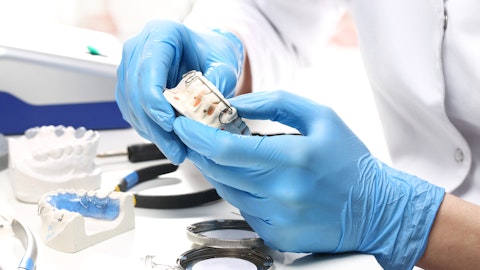ZimVie Inc. (NASDAQ:ZIMV) Q1 2024 Earnings Call Transcript May 11, 2024
ZimVie Inc. isn’t one of the 30 most popular stocks among hedge funds at the end of the third quarter (see the details here).
Operator: Good afternoon and welcome to ZimVie’s First Quarter 2024 Earnings Conference Call. Currently, all participants are in a listen-only mode. We will be facilitating a question-and-answer session towards the end of today’s call. As a reminder, this call is being recorded for replay purposes. I would now like to turn the call over to Marissa Bych from Gilmartin Group for introductory disclosure.
Marissa Bych: Thank you all for joining today’s call. Earlier today, ZimVie released financial results for the quarter ended March 31, 2024. A copy of the press release is available on the company’s website, zimvie.com, as well as on sec.gov. Before we begin, I’d remind you that management will make comments during this call that include forward-looking statements. Actual results may differ materially from those indicated by the forward-looking statements due to a variety of risks and uncertainties. Please refer to the company’s most recent periodic report filed with the SEC and subsequent SEC filings for a detailed discussion of these risks and uncertainties. In addition, the discussion on this call will include certain non-GAAP financial measures.
Reconciliations of these measures to the most directly comparable GAAP financial measures are included within the earnings release and the investor deck issued today found on the Investor Relations section of the company’s website. This conference call contains time-sensitive information and is accurate only as of the live broadcast today, May 8, 2024. ZimVie disclaims any intention or obligation, except as required by law, to update or revise any financial projections or forward-looking statements, whether because of new information, future events, or otherwise. With that, I will turn the call over to Vafa Jamali, President and Chief Executive Officer of ZimVie.
Vafa Jamali: Good afternoon and thank you all for joining us. We’ve had an active 2024 thus far and I’m pleased with our progress. With the recent sale of our Spine business for $375 million in total consideration, including $350 million in cash and a $60 million promissory note, we’re delivering on our promise to reshape the financial profile of our business. Immediately following the sale, we paid down $275 million of debt and refocused our organization as a pure-play dental company with a comprehensive and industry-leading portfolio. We’ve already begun taking concrete actions to right-size our cost profile following the sale of Spine. In addition to reducing our corporate infrastructure, we’re also reducing corporate expenses such as IT costs and legal expenses, while continuing to optimize our manufacturing operations.
We’re confident in executing further rightsizing actions to improve our margin profile over the next year, and we’re also confident in our pathway for continued improvement for the years that follow. I’m very excited for the future of this company as we continue to invest in differentiated solutions for patients and providers, scale the adoption of those solutions, and improve the efficiency of our business to deliver shareholder value. As we enter our first full quarter as a leaner, more focused dental company, we have all the components to man and grow our leadership position in this $8 billion implant, digital solutions, and biomaterials market. Our strategy is grounded in delivering outstanding, innovative products to our customers in support of gaining market share, while driving the expansion of the implant dentistry market as a whole.
Our best-in-class implant portfolio is led by our TSX and T3 PRO premium dental implants and also hold surgical tools abutments and restorative components. TSX and T3 PRO our most recent implant launches and have both demonstrated rapid and strong commercial traction. Our biomaterials portfolio includes a wide selection of bone graft substitutes membrane, new tissue products and regenerative products with the history of well-documented clinical results. This portfolio includes our leading Puros allograft solution. Our biomaterials products are also used in implant procedures to provide the foundation for the implant and create a desirable aesthetic outcome. Our digital dentistry portfolio includes end-to-end digital solutions for tooth replacement procedures, including intraoral scanning solutions and guided surgery software.
By using these digital solutions, our customers are recognizing greater efficiency in their workflow, benefiting from enhanced procedural accuracy and focusing more time on what they do best, performing implant surgeries. Practices that adopt our digital workflow solutions typically perform many more implant cases than practices that don’t. In addition, these practices are seeing excellent patient satisfaction, reduce patient chair time, great outcomes, especially in customized restorative small operations. We estimate that only about 20% of dental implant cases today are performed using the complete digital workflow. As a result, we see an incredible opportunity to continue training providers on the benefits of our software and our guided surgery sets, which can yield further growth and adoption.
Across our portfolio, our commercial advantage stems from the value we are delivering across stakeholders, patients, clinicians, and the dental lab. Medical education and training are greatly aiding in the adoption of workflow technologies. In our industry leading training and education programs, we bring dentists to our institutes in Carlsbad, California, Palm Beach Gardens, Florida, and Switzerland. We also hold regular hands-on in didactic programs in the field to educate clinicians and grow the field with implantology. We expect that our efforts to deliver efficient, high-quality differentiated solutions to the net practices, coupled with comprehensive training, will form the basis for healthy, long-term growth in our business. With a little focus on operational progress.
Over the past two years, our team has worked immensely hard to execute material operational improvements across our business. Many of those improvements were focused within our Spine business. As we move forward, we’ll take much of that same playbook to our Dental business, including a focus on manufacturing automation, supply chain optimization, and improving the efficiency of our plants. As a result of these plans, we expect to drive the margin improvement previously mentioned. That said, our platform is driven by innovation and customer satisfaction. I should be very clear that our efficiency improvements will not be reflected to reduce research and development or reduce commercial costs. I’ll now turn the line over to Rich to review our financial performance and forward outlook in greater detail.

Richard Heppenstall: Thanks Vafa and good afternoon everyone. I’ll begin by reviewing our first quarter 2024 results and will close by providing commentary on our outlook for the full year 2024. As a reminder, we finalized the sale of our Spine business on April 1st, 2024. Thus, our Spine segment is reflected in discontinued operations in our financial statements. Like we did at the time of our Q4 2023 financial filings, we have begun — bifurcated our Q1 2024 financials between continuing operations, which comprises our Dental business and the majority of corporate costs and discontinued operations, which includes the legacy Spine business. Please refer to our 10-Q for financial results from discontinued operations. Turning to continued operations.
Third-party net sales for the first quarter of 2024 were $118.2 million, a decrease of 1.6% in reported rates and a decline of 1.4% in constant currency. In the U.S. third-party net sales for the first quarter of 2024 of $67.7 million, decreased by 3.1%, driven by a weaker implant market and lower iTero capital sales, partially offset by strength in our digital solutions and biomaterials portfolios. Outside of the U.S., third-party net sales of $50.4 million increased 0.4% on a reported basis and up 1.1% in constant currency. We have seen stability in the OUS dental market over recent quarters and our competitive position remains strong in the core markets we serve. First quarter 2024 adjusted cost of products sold was 37.2% compared to 35.4% of sales in the prior year period due to unfavorable product mix and lower manufacturing absorption.
We expect improvement in cost of products sold over time as we streamline the organization, cut duplicative cost, improve manufacturing efficiency, and benefit from a more favorable product mix as implant sales recover. Q1 2024 adjusted reserve development expense of $6.3 million or 5.3% of sales compared to $5.9 million or 4.9% of sales in the prior year. Q1 2024 adjusted sales, general, and administrative expenses of $60.3 million compared to $66.3 million in the prior year, driven largely by reductions in IT and legal expenses. Adjusted EBITDA attributable to continuing operations in the first quarter of 2024 was $12.5 million or a 10.5% EBITDA margin. Q1 2024 adjusted earnings per share attributable to continuing operations was $0.08 a share on a fully diluted share count of 27.1 million shares.
We are very pleased with our financial performance in the first quarter of 2024 as we are delivering on our plan to resize and reposition ZimVie as a pure-play dental company. We remain committed to achieving our financial objective of 15% plus EBITDA margins one year post Spine sale. As Vafa mentioned earlier in the call, we are very pleased with the position of our balance sheet following the repayment of $275 million of debt on April 1st. As of April 2nd, 2024, we had a consolidated ZimVie cash balance of approximately $66 million and a gross debt balance of approximately $234 million, yielding a net debt balance of approximately $178 million. In addition, we are maintaining $175 million revolving credit facility, which remains undrawn. As we think about capital allocation on a go-forward basis, we will continue to fund the business and our priority will be to deploy excess cash flow to further reduce debt.
That being said, we will continue to operate the business as a meritocracy, deploying resources to the highest return initiatives. Turning now towards our outlook for the full year 2024. We are expecting revenue for fiscal year 2024 to be in the range of $450 million to $460 million, reflecting an increase of 0.2% and at the midpoint compared to 2023. We believe that our guidance appropriately accounts for the modest year-over-year decline we experienced in Q1 and some ongoing softness in our end markets, particularly implants in the U.S. We are confident that our differentiated product portfolio and our executional strength positions us very well for when our end markets stabilize and improve. Specifically looking at the second quarter of 2024.
Given current trends in the U.S. implant market, we expect our Q2 revenue to be sequentially lower by 1% to 3%, largely similar to the seasonal sales patterns in 2022 and 2023. We expect fiscal year 2024 adjusted EBITDA to be in the range of $60 million to $65 million, resulting in an adjusted EBITDA margin in the range of 13.3% to 14.1% of sales. As our guidance implies, we are pleased with our performance to-date and we expect to generate increasing adjusted EBITDA in Q2 now that we have sold the Spine business. As mentioned earlier, we remain committed to a 15% plus adjusted EBITDA margin by April 1st, 2025. Turning to our interest expense profile. Considering our recent action to pay down a substantial portion of our debt and the payment in kind interest we will be accruing on the seller note with H.I.G., we now expect 2024 interest expense to be approximately $12.5 million to $13 million, inclusive of $4.4 million of interest expense for the first quarter of 2024.
Share-based compensation expense is expected to be in the range of $16 million to $16.5 million for the full year. We expect to generate adjusted earnings per share of $0.55 to $0.70 per share on a fully-diluted share count of 28.5 million shares. With that, I’ll now turn the call back over to Vafa.
Vafa Jamali: Thank you, Rich. I’m excited about the prospects ahead of us. And as always, I look forward to updating you on our progress throughout the year. I’m pleased with the success we’ve had over the past year, and we’ve completely reshaped ZimVie as an organization while delivering significant shareholder value. I’m equally energized by the opportunity ahead of us as a pure-play dental company. With that, we’ll open it up to questions.
Operator: [Operator Instructions] The first question comes from the line of Matt Miksic of Barclays. Matt, please go ahead.
See also Insider Buying Alert: CEOs Are Buying These 10 Stocks and 20 Largest Banks in the US by Asset Size in 2024.
Q&A Session
Follow Zimvie Inc. (NASDAQ:ZIMV)
Follow Zimvie Inc. (NASDAQ:ZIMV)
Receive real-time insider trading and news alerts
Matt Miksic: Hey guys. Thanks for taking the questions.
Matt Miksic: Hey Matt.
Richard Heppenstall: Hey Matt.
Matt Miksic: So, maybe, Vafa, if I could follow up on your comment about mix and maybe just a little more color on what the shifts in mix have been so far this year as you were describing and sort of what kinds of catalysts or actions you can take to help sort of drive improving mix throughout the rest of the year? And then I have one follow-up.
Vafa Jamali: Sure. So, we are seeing mix have an impact on us. It’s both geographical and the portfolio, I think, is where we’re feeling it the most. Rich, perhaps you could give us a little bit of color on where we’re seeing it specifically.
Richard Heppenstall: Yes. Hey Matt. Our revenue story for Q1 actually boils down to two items. The first one of which is we’re experiencing some pressure on the capital sales side. And so the iTero that we distribute, right, which is lower margin for us, was lower in the quarter versus prior year. The other area is around implants, but specifically around the U.S., and so we’re seeing a continued challenging market in U.S. implants. But we’re seeing strength across the rest of the portfolio, including biomaterials and digital. And we’re also — as you noticed from the press release, we’re also seeing strength on U.S. I mean our European organization grew over 4% in the quarter, for example, inclusive of that 1% plus constant currency growth for the quarter. But it both largely rolls down to iTero sales in U.S. implants.
Vafa Jamali: With that, Matt, also pricing has been actually pretty stable for us. So, unlike what we’ve heard from others, pricing has been relatively stable, we’re down about 1%, which I think different from what we’ve been reading.
Matt Miksic: That’s great. And then on the path to 15% EBITDA, what you’re talking about now, I guess as of buying April 1st to that, am I right to read that as first quarter next year, that’s what we should expect you to be printing? Or again, just understanding the timing of — full year next year?
Vafa Jamali: Correct. We’re seeing at the end of that period, we will be at 15%. And like always, we’ll be doing everything we can to kind of get to that quicker and to continue to make improvements to it.
Matt Miksic: Okay. And some of the things you just mentioned, mix, obviously, having an impact this year. I’m sure as you map that path to 15%, maybe if you could talk a little bit more detail about sort of operationally, either internally or execution commercially, that you think will be the sort of like the key drivers of helping get there on time or faster?
Vafa Jamali: Right. So, if you look at — if you break down our costs, I mean, largely, we have a corporate infrastructure that was bigger. Imagine we were running at ZimVie more like a holding company with a couple of divisions where we had to have a central group and then where else, we’re really collapsing that. So, there’s an element of cost there and we’ve taken a large portion of that already out. And then the next piece is that you look at our legal costs and IT costs, which are probably the next two biggest buckets, and we are taking those ones out. So those are mostly fees paid, services purchased from, for example, the IT is basically subscription services and licenses that we will renew at a much lower rate. And we’ve got a plan on those basically laid out where we know exactly when the price — when the cost will come out.
And then on top of that, we do also have transition service agreements, which are also funded by H.I.G.’s acquisition of Spine, which we also help kind of buffer some of that as well. Rich, anything I missed on that?
Richard Heppenstall: Yes. Just quickly to your commercial execution comment, right? I mean, even though there’s some macro challenges that I think pretty well known within the down market. But I think from a commercial perspective and a commercial execution perspective, one of the things that we’re finding is the strength of parts of our products, like in particular around digital, are really sticky with our customers. And so we don’t really talk about it too often on like a same-store sales basis. We’re just seeing a decline in same-store sales, but we’re not necessarily seeing customers like leading the organization. And so the industry is talking about stabilizing towards the back part of the year, and so we feel as though our commercial execution and the strength of our portfolio is going to position us really well for the back half.
Matt Miksic: Okay. So, some rationalization, some kind of internal cost programs. And maybe it sounds like is it fair to characterize the digital revenue line as a bit more subscription and less sort of episodic procedure at the way of the puts and takes of procedure flows? So, maybe just a little softer than we might see in sort of maybe implants. Is that a fair way?




